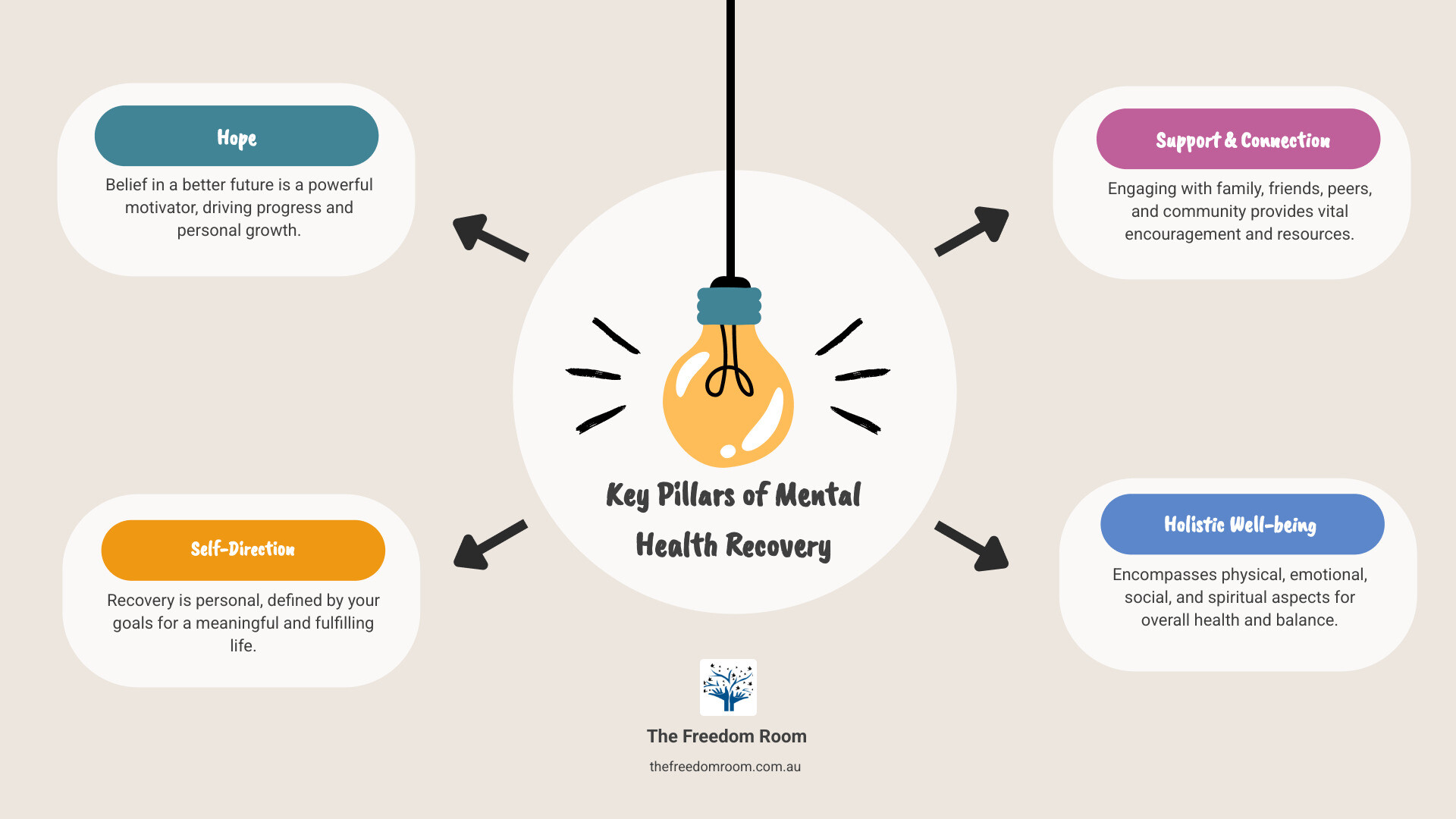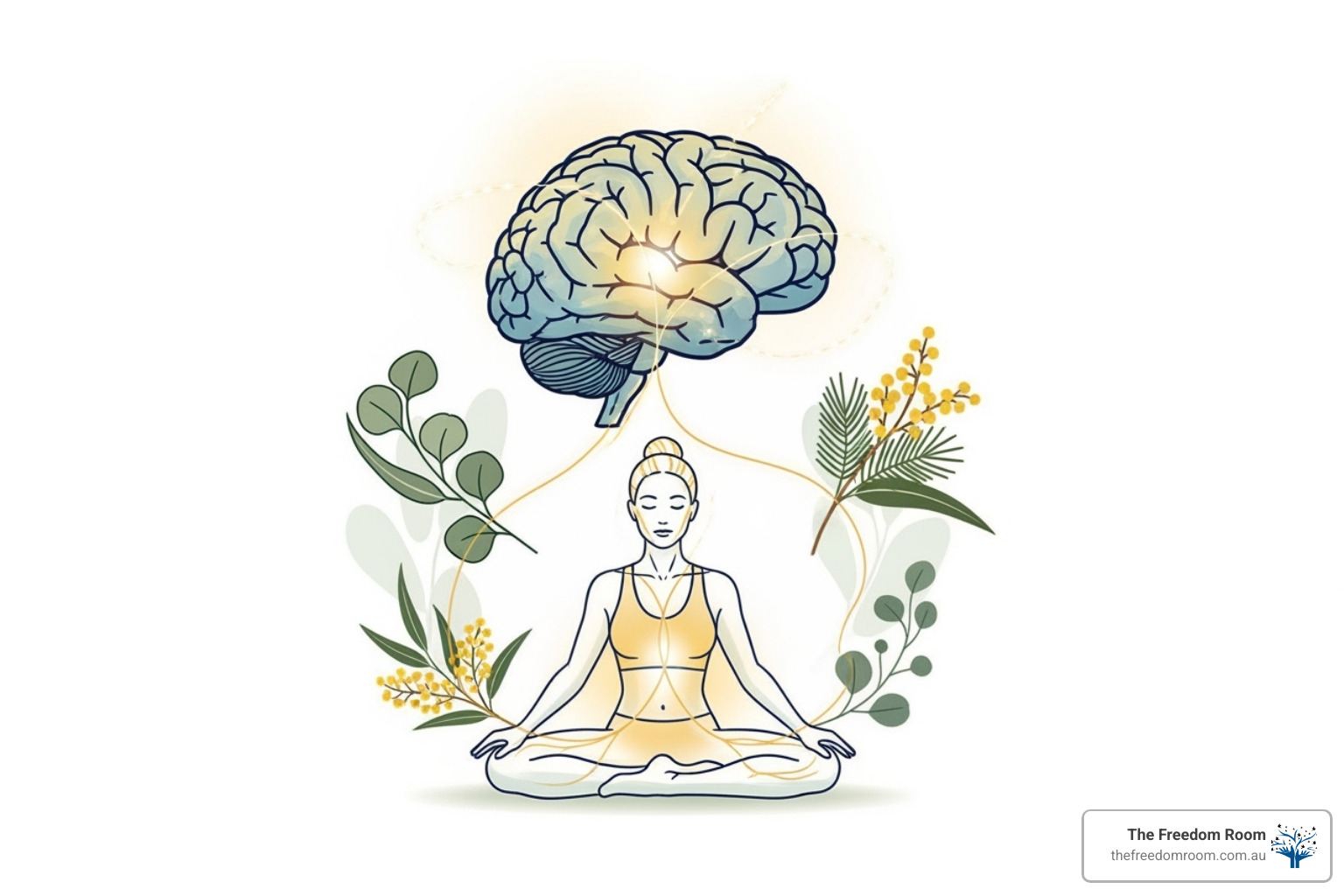Introduction: Understanding the Journey of Recovery
Starting on a journey towards mental health in recovery means dedicating yourself to a process of profound personal growth and improved well-being. It is about building a fulfilling life, often despite ongoing challenges. This path is not simply the absence of symptoms, but a dynamic and unique process for each individual.
For someone navigating mental health recovery, it is helpful to know:
- Recovery is Personal: It is defined by you, focusing on what a meaningful and hopeful life looks like, rather than a clinical checklist.
- It’s a Journey, Not a Destination: Recovery is an ongoing process with ups and downs. Progress is often gradual, and setbacks are a normal part of the path.
- Hope is Essential: Belief in a better future is a powerful motivator. Connecting with others and finding purpose are key elements.
- Support Matters: Family, friends, peer networks, and professional assistance play vital roles in providing encouragement and resources.
- Holistic Well-being: Recovery encompasses your overall health, including physical, emotional, social, and spiritual aspects.
This article explores what mental health recovery truly means. It examines how our understanding of recovery has evolved, the crucial link between mind and body, and the practical steps you can take. We also look at common barriers and alternative perspectives to empower you on your journey.

Mental health in recovery glossary:
- Work-Life Balance and Burnout Prevention
- alcohol and stress management
- therapy for alcohol addiction
Defining Recovery: A Shift from Cure to Personal Empowerment
The concept of mental health in recovery has transformed. It no longer means just the absence of symptoms or a return to a ‘normal’ state. Today, recovery is understood as a personal and empowering process.
Recovery is about living a fulfilling life on your own terms, beyond your challenges. This shift moves from a medical model focused on deficits to a holistic approach that recognises your strengths, hopes, and potential. The modern view acknowledges you as the expert on your life, striving to reach your potential even alongside ongoing symptoms.
The Evolution of the Recovery Model
Historically, mental health care was dominated by institutional settings. People were often passive recipients of treatment focused on symptom management, with little regard for their personal aspirations.
The consumer-survivor movement catalysed change. People with lived experience demanded more than symptom management; they wanted meaningful lives. Their stories of hope and resilience challenged prevailing pessimistic attitudes.
These advocates shifted the focus from deficits to possibilities, emphasising that recovery involves reclaiming identity, purpose, and connection. This led to recovery-oriented services that prioritise hope, empowerment, and community. The modern recovery model now focuses on quality of life and person-centred care, valuing each unique journey.
Clinical Recovery vs. Personal Recovery: What’s the Difference?
Distinguishing between clinical and personal recovery is helpful for your journey. Both are important but serve different purposes and are measured differently.
Clinical recovery is what healthcare professionals measure. It focuses on symptom reduction, improved functioning, and meeting clinical benchmarks. These measures are important for tracking treatment effectiveness.
Personal recovery, on the other hand, is defined by you. It encompasses hope, identity, meaning, and responsibility. It means living a fulfilling life, even with ongoing symptoms, by building the life you want.
Research highlights this personal dimension. A study found 82% of people with psychosis agreed that ‘Recovery is knowing that you can help yourself become better.’ This shows the importance of self-direction and empowerment. For more insights, you can explore the empirical evidence about recovery and mental health.
Why This Distinction Matters for Your Journey
Recognising this distinction is liberating, putting you in control of your life. While clinical improvements are valuable, your recovery is not solely dependent on them.
This understanding fosters self-direction and empowerment. You decide what recovery means for you, whether it’s returning to work, rebuilding relationships, or finding new passions. Your goals are unique, and that is how it should be.
Personal recovery offers hope when clinical progress is slow. You can build meaning and purpose regardless of your symptoms. This approach supports your individuality and personal growth.
At The Freedom Room, we understand that mental health in recovery is a personal journey. Our team, with lived experience of recovery, knows that healing happens when you are supported to define and pursue a life that matters to you.
The Intricate Link Between Mind and Body in Recovery
With mental health in recovery, the deep connection between mind and body is impossible to ignore. This fundamental truth shapes every aspect of healing, as your thoughts, emotions, and physical wellbeing are intricately linked.
Understanding this connection is key to a more complete and lasting recovery. Grasping how your mental state influences your physical health, and vice versa, provides powerful tools for healing.
How Mental and Physical Health are Interconnected
The mind-body relationship is a two-way street. Mental health challenges often manifest physically, and physical health problems can worsen mental health.
For example, chronic stress floods your system with cortisol, which can weaken your immune system. Depression can slow wound healing and extend recovery times. Your body directly responds to your emotional state.
This connection can lead to diagnostic overshadowing in healthcare, where physical symptoms are wrongly attributed to a mental health condition. Consequently, in high-income countries, men with mental illness face a 20-year mortality gap, and women a 15-year gap, compared to the general population.

These statistics highlight why caring for your mental health is integral to your overall wellbeing. Understanding this connection helps you advocate for comprehensive care.
The Role of Motivation and Engagement in the Recovery Process
Your mental state greatly influences your engagement in recovery. Hope and self-efficacy, the belief you can influence outcomes, make you more likely to follow treatment plans and progress towards goals.
When motivated, attending therapy and working towards goals feels manageable. You are more likely to adhere to medication and actively engage in recovery.
Conversely, depression and anxiety can cause apathy, making self-care feel overwhelming. Cognitive Behavioural Therapy (CBT) is invaluable here, as it helps challenge unhelpful thought patterns that derail motivation.
At The Freedom Room, we understand this mental engagement is crucial. Our approach helps build the resilience and motivation essential for lasting recovery.
Managing Pain: The Influence of Anxiety and Depression
Your emotional state deeply influences your experience of physical pain. Anxiety or depression can heighten your stress response, increasing pain sensitivity. This can lead to central sensitisation, where your nervous system becomes more reactive.
Hypervigilance, an anxious focus on bodily sensations, can intensify pain. Constantly scanning for discomfort can make minor sensations feel overwhelming, slowing recovery.
Effective emotional regulation strategies are essential. At The Freedom Room, we use Emotional Freedom Techniques (EFT), or tapping, to address the emotional component of pain by gently processing emotions like fear and anger.
This technique sends calming signals to the amygdala, your brain’s alarm system, disrupting the stress response. As your nervous system balances, pain perception often decreases, making it an effective way to manage anxiety and the physical effects of stress.
Building a Foundation for Sustainable Mental Health in Recovery
A strong foundation for mental health in recovery is built through consistent daily choices that nurture your mind and body. Small, consistent actions can create profound changes over time, providing stability and a sense of control during uncertain times.
Essential Lifestyle Habits for a Strong Mental Health in Recovery
These lifestyle habits are the pillars supporting your recovery journey, creating the conditions for healing to flourish.

- Balanced nutrition: Nourishing your body with whole foods provides your brain with essential building blocks. Nutrients like Omega-3s and antioxidants can improve mood and cognitive function.
- Regular physical activity: Moderate exercise acts as a natural antidepressant by releasing mood-lifting endorphins. The NHS provides excellent guidance on this topic.
- Consistent sleep hygiene: Quality sleep is vital for processing emotions and consolidating memories. Poor sleep can worsen anxiety and depression, and the NHS offers valuable insights on improving sleep.
- Mindfulness and relaxation practices: Techniques like meditation, deep breathing, and EFT help retrain your brain’s stress response and build long-term emotional resilience.
- Meaningful social connections: These connections provide encouragement and understanding. At The Freedom Room, we offer emotional support for families affected by addiction.
- Purposeful activity: Engaging in work, volunteering, or creative pursuits gives life meaning beyond recovery, building self-worth and positive momentum.
The Influence of Mental State on Maintaining Healthy Habits
Knowing what is good for you and consistently doing it are different things, especially when dealing with mental health challenges. Depression can cause overwhelming apathy, while anxiety can make social connection feel threatening, creating a vicious cycle.
Starting small creates momentum. A five-minute walk is more achievable than an hour at the gym. Our therapeutic approaches, including CBT and EFT, address these barriers by helping you challenge unhelpful thoughts and process emotional blocks. These tools build the self-compassion and motivation needed for lasting change.
We encourage exploring various self-care activities to find what resonates with you.
Creating a Personalised Plan for Mental Health in Recovery
Recovery is not a one-size-fits-all journey. A personalised plan honours your unique needs, strengths, and circumstances.
- Set SMART goals: Turn aspirations into achievable steps, like “walk for 15 minutes three times this week,” to celebrate real progress.
- Identify triggers: Become aware of your patterns to prepare with coping strategies, not to avoid life.
- Develop coping strategies: Build a toolkit before you need it, including options like calling a friend or practising EFT.
- Build support networks: Identify professionals, peers, family, and friends you can turn to. Recovery thrives in community.
- Establish a routine: Create predictable patterns that support your wellbeing and provide comfort when emotions feel chaotic.
A downloadable wellbeing plan template can help organise these elements. This structured approach is valuable for preventing relapse, as detailed in our mental health relapse prevention guide.
Overcoming Barriers and Challenging Perspectives on Recovery
The journey towards mental health in recovery rarely unfolds in isolation. It takes place within a broader social context that can either support or hinder progress. Understanding and addressing these external challenges is essential for creating an environment where recovery can truly flourish.
Navigating Societal and Systemic Problems
One of the most significant problems people face in their recovery journey is the weight of societal stigma and discrimination. These attitudes create an invisible barrier that can be just as challenging as the mental health condition itself. When society views mental health struggles through a lens of shame or fear, it becomes incredibly difficult for individuals to seek help openly or maintain their self-worth throughout the recovery process.
The statistics paint a concerning picture of how our healthcare systems prioritise mental health. Across the globe, the vast majority of countries allocate less than 2% of their health budgets to mental health services. This chronic underfunding translates into real-world consequences: longer waiting times, limited treatment options, and significant gaps in care, particularly in regional areas.
Beyond the healthcare system, the social determinants of health play a crucial role in recovery outcomes. Stable housing, meaningful employment, and financial security form the foundation upon which sustainable recovery is built. Without these basic needs met, even the most effective therapeutic interventions can struggle to take hold. These systemic issues require acknowledgement and advocacy, as they significantly impact an individual’s capacity to maintain their mental well-being.

Our comprehensive approach recognises these complex challenges, which is why we’ve developed our Mental Health Support Complete Guide to help you steer these various barriers effectively.
Reframing the Narrative: Positive Impacts of Mental Health Challenges
While we never minimise the genuine pain and difficulty that mental health challenges bring, there’s another side to this story that deserves recognition. Many individuals find that their journey through mental health difficulties, though arduous, becomes a pathway to profound personal change.
This phenomenon, known as post-traumatic growth, reveals how adversity can catalyse remarkable positive changes. Through navigating their challenges, people often develop increased empathy for others facing similar struggles. They build resilience that serves them well beyond their initial recovery. Perhaps most significantly, many find a survivor mission, where their experiences become a source of meaning and purpose in helping others.
The process of confronting mental health challenges can lead to a clearer understanding of personal values. When faced with difficulties, people often reassess what truly matters to them, leading to more authentic and fulfilling lives. This isn’t about romanticising struggle, but rather recognising the human capacity for growth and change even in the midst of difficulty.
At The Freedom Room, we witness this change regularly. Our Personal Growth in Recovery approach honours both the challenges and the potential for growth that exists within each person’s journey.
Challenging the Idea of Inevitable Decline
For too long, certain mental health conditions have been shrouded in pessimistic narratives that suggested inevitable decline and limited hope for recovery. This outdated perspective has caused immeasurable harm, creating self-fulfilling prophecies that limit both individual expectations and societal support for recovery efforts.
Recent research presents a dramatically different picture. The psychosis continuum model shows us that experiences like voice hearing occur across a broad spectrum of the population. Research indicates that 13.2% of the general adult population experiences voice hearing at some point, yet many of these individuals never require mental health services and lead fulfilling lives.
Long-term studies of conditions like schizophrenia reveal that more than 50% of people experience significant clinical recovery over 20-year follow-up periods. These findings challenge the traditional narrative and offer genuine hope for those beginning their recovery journey.
The International Hearing Voices Movement has been instrumental in reframing how we understand these experiences. Rather than viewing them solely through a medical lens, this movement recognises that such experiences can be meaningful and that individuals have tremendous capacity for self-management and empowerment.
Understanding the role of past experiences, particularly trauma, in mental health conditions has also shifted our perspective significantly. Our Trauma-Informed Addiction Guide explores how addressing underlying trauma can fundamentally change recovery outcomes, moving us away from managing symptoms towards healing root causes.
These evolving understandings remind us that mental health in recovery is not about returning to a previous state, but about moving forward towards a life of greater meaning, connection, and well-being. The human capacity for resilience, growth, and healing is far greater than traditional models have suggested.
Ready for Change? Let’s Build a Stronger, Alcohol-Free Future Together
Your journey towards mental health in recovery is uniquely yours, filled with both challenges and tremendous possibilities. Throughout this exploration, we have finded that recovery extends far beyond simply managing symptoms. It represents a profound shift towards living a meaningful, self-directed life where hope and personal empowerment take centre stage.
The evolution from traditional medical models to person-centred recovery approaches has opened new pathways for healing. We now understand that clinical recovery and personal recovery work hand in hand, yet it is your personal definition of recovery that truly matters. This understanding places you firmly in the driver’s seat of your own journey.
The mind-body connection plays a crucial role in this process. Your mental state influences everything from motivation and treatment engagement to how you experience physical discomfort. When we address both mental and physical aspects of well-being together, we create a stronger foundation for lasting change.
Building sustainable habits forms the cornerstone of recovery. Whether it involves balanced nutrition, regular physical activity, consistent sleep hygiene, mindfulness practices, meaningful social connections, or purposeful activities, each element contributes to your overall resilience. We recognise that maintaining these habits can feel overwhelming when you are struggling, which is why starting small and celebrating every step forward matters so much.
Creating your personalised recovery plan empowers you to identify your triggers, develop effective coping strategies, and build supportive networks. This living document grows and adapts with you, reflecting your changing needs and expanding strengths.
While societal barriers and stigma remain real challenges, we have also seen how mental health experiences can lead to profound personal growth. Post-traumatic growth, increased empathy, and clearer personal values often emerge from these difficult journeys. The outdated narrative of inevitable decline is being replaced by evidence showing that recovery is not only possible but common.
At The Freedom Room, our team understands these challenges intimately because we have walked similar paths ourselves. This lived experience, combined with our professional training, allows us to offer genuine empathy and practical support. Whether you join us in Strathpine QLD or access our online services, we provide personalised sessions, workshops, and therapy designed specifically for your needs.
Our approach combines evidence-based techniques that address both the emotional and cognitive aspects of recovery. Emotional Freedom Techniques (EFT) helps you gently process difficult emotions by sending calming signals to your brain’s alarm system, while Cognitive Behavioural Therapy (CBT) supports you in identifying and changing unhelpful thought patterns and behaviours.
Your capacity for healing and growth is immense. Every step you take towards recovery, no matter how small it may seem, represents courage and strength. We are here to support you in building not just an alcohol-free life, but a life filled with purpose, connection, and genuine well-being.
Take that first step today. Your future self will thank you for the courage you show right now.
- Explore our comprehensive EFT and CBT therapy services
- Find our specialised CBT techniques for addiction
- Learn more about our personalised addiction counselling approach

